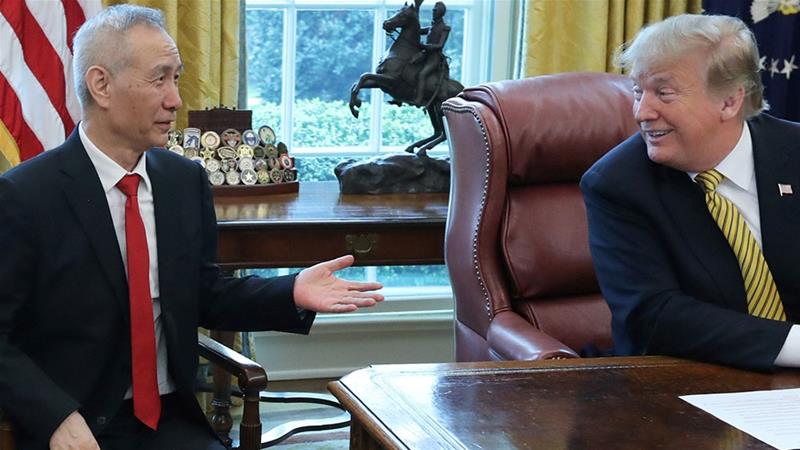US prepares to raise China tariffs; Beijing threatens retaliation
Trump says he’s ‘happy’ to keep tariffs on Chinese goods as the two countries prepare to resume trade talks.
US President Donald Trump said on Wednesday he would be happy to keep tariffs on Chinese imports, prompting Beijing to threaten retaliation, as the world’s two largest economies prepared to resume talks to end a trade war that has roiled global supply chains and financial markets.
The United States and China have locked horns over trade since last year when the Trump administration slapped levies on billions of dollars worth of Chinese goods and demanded the Asian nation adopt policy changes that would, among other things, make China’s markets more accessible to US companies.
Beijing has responded in kind with its own tariffs on a range of US goods including soybeans and pork products.
Although expectations have mounted that the two sides appeared to be nearing a deal, relations have soured in recent days.
Reuters, citing US government and private-sector sources, reported on Wednesday that China late last week had backtracked on almost all aspects of a draft trade agreement, threatening to blow up the negotiations.
Trump, who has embraced largely protectionist policies as part of his “America First” agenda, warned China on Wednesday that it was mistaken if it hoped to delay a trade deal until a Democrat controlled the White House.
“The reason for the China pullback & attempted renegotiation of the Trade Deal is the sincere HOPE that they will be able to ‘negotiate’ with Joe Biden or one of the very weak Democrats,” Trump, a Republican, tweeted on Wednesday, without citing any evidence.
“Guess what, that’s not going to happen! China has just informed us that they (Vice-Premier) are now coming to the U.S. to make a deal. We’ll see, but I am very happy with over $100 Billion a year in Tariffs filling U.S. coffers,” he added.
China has announced it is sending Vice-Premier Liu He, its lead negotiator for the trade dispute, to Washington, DC for talks on Thursday and Friday, which some observers have taken as a sign that Beijing wants to strike a deal.
In the meantime, the US government said in its official journal on Wednesday it would raise tariffs on $200bn of Chinese goods to 25 percent from 15 percent effective at 12:01am EDT (04:01 GMT) on Friday. Trump announced the plan on Sunday.
Separately, China’s Commerce Ministry said it would respond in kind, adding that escalating trade frictions were not in the interest of either country or the world.
Speaking to reporters, White House spokeswoman Sarah Sanders separately said the Trump administration has received an “indication” that China wants an agreement. Major stock indexes rebounded from this week’s earlier losses after her comments.
Sweeping changes
The US is demanding Beijing make sweeping changes to its trade and regulatory practices, including protecting US intellectual property from theft and forced transfers to Chinese firms, curbs on Chinese government subsidies and increased American access to China’s markets.
Trump also has sought massive hikes in Chinese purchases of US farm, energy and manufactured products to shrink a gaping US trade deficit with China.
But sources familiar with the talks said China’s latest demands for changes to a 150-page document that had been drafted over several months would make it hard to avoid the US tariff rise on Friday. That increase would affect Chinese imports from computer modems and routers to vacuum cleaners, furniture, lighting and building materials.
Scott Kennedy, a China expert at the Center for Strategic and International Studies in Washington, said the talks were at a delicate stage and much depended on what sort of proposal Liu is bringing to Washington, Dc.
“I think the Trump administration is quite serious about imposing tariffs,” Kennedy said. “I don’t think Liu He would have agreed to come if he was just going to give the US a lecture.”
Source: Read Full Article



